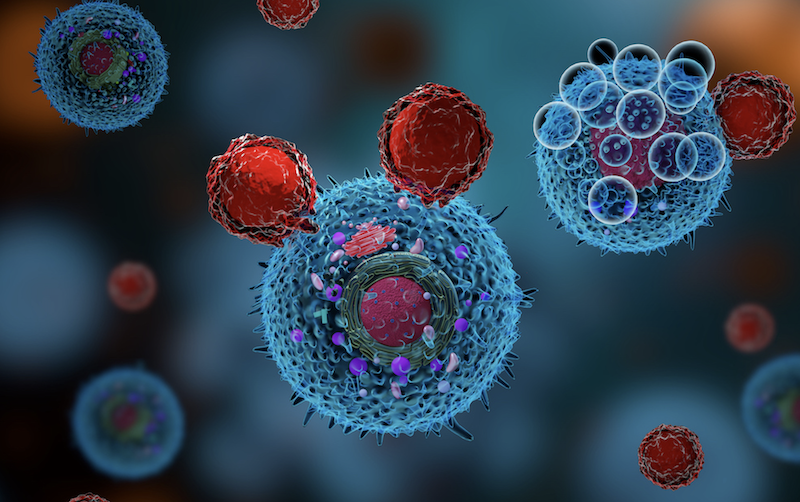FDA grants accelerated approval to epcoritamab for relapsed/refractory follicular lymphoma
On June 26, 2024, the U.S. Food and Drug Administration (FDA) approved epcoritamab for the treatment of adult patients with relapsed/refractory (R/R) follicular lymphoma (FL) after two or more lines of systemic therapy.1
FL is a highly heterogenous form of indolent non-Hodgkin lymphoma (NHL). There is currently an unmet treatment need for patients with R/R FL, particularly for those who experience disease progression within 24 months (POD24) of initial chemoimmunotherapy.2
Epcoritamab is a CD20-directed, CD3 T-cell-engaging bispecific antibody that is administered subcutaneously.2 The Phase I/II EPCORE NHL-1 study (NCT03625037), an open-label, multi-cohort, single-arm trial, assessed the safety and efficacy of epcoritamab. Participants included patients with diffuse large B-cell lymphoma (DLBCL), mantle cell lymphoma (MCL) and FL.3 In the FL cohorts, 127 patients with R/R disease received a two step-up dosing regimen and an additional cohort of 86 patients received a three step-up dosing regimen to mitigate cytokine release syndrome (CRS).1
The primary endpoint of the study was met, with an overall response rate (ORR) of 82% (95% CI: 74.1, 88.2), with 60% of patients achieving a complete response (CR). After a median follow-up of 14.8 months, the estimated median duration of response (DOR) among responders was not reached. Using the Kaplan-Meier method, the 12-month estimated DOR was 68.4% (95% CI: 57.6%, 77.0%). Comparable findings were seen in patients who received the three step-up dosing.1
We spoke with Umberto Vitolo, MD, Candiolo Cancer Institute, Turin, Italy, at the 29th Congress of the European Hematology Association (EHA) in Madrid, Spain, who shared findings from the R/R FL cohorts in the EPCORE NHL-1 trial. He highlighted that ‘this response is achieved very early, because the median time to achieve the complete response was 1.5 months. Also, the response is deep, as assessed by the measurement of minimal residual disease (MRD)’.
The most common adverse events (AEs) included CRS, injection-site reactions, COVID-19 infection, upper respiratory tract infection, and fatigue. Immune effector cell-associated neurotoxicity (ICANS) occurred in 6% of patients. CRS occurred in 49% of patients on the three step-up dosing schedule, all grade 2 or lower. The most common grade 3 to 4 abnormalities included decreased lymphocyte count, decreased white blood cell count, decreased neutrophil count, and decreased hemoglobin.1
A Phase III trial is currently underway to validate the efficacy of epcoritamab in combination with rituximab and lenalidomide (R2) in patients with R/R FL (EPCORE FL-1: NCT05409066). This agent has the potential to improve outcomes for patients and address a critical unmet treatment need.
References
- U.S. Food and Drug Administration. FDA grants accelerated approval to epcoritamab-bysp for relapsed or refractory follicular lymphoma. Available here. (Last accessed 28/06/2024).
- Linton K, Jurczak W, Lugtenburg P, et al. Epcoritamab SC Monotherapy Leads to Deep and Durable Responses in Patients with Relapsed or Refractory Follicular Lymphoma: First Data Disclosure from the Epcore NHL-1 Follicular Lymphoma Dose-Expansion Cohort. Blood. 2023 November 02;142 (Supplement 1): 1655.
- U.S. National Library of Medicine. First-in-Human (FIH) Trial in Patients With Relapsed, Progressive or Refractory B-Cell Lymphoma (EPCORE™ NHL-1). Available here. (Last accessed 28/06/2024).
Written by Hannah Elkheir
Edited by Anya Dragojlovic Kerkache & Raffaella Facchini





